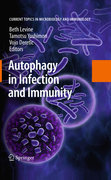
Autophagy is a fundamental biological process that enables cells to autodigest their own cytosol during starvation and other forms of stress. It has a growing spectrum of acknowledged roles in immunity, aging, development, neurodegeneration, and cancer biology. An immunological role of autophagy was first recognized with the discovery of autophagy’s ability to sanitize the cellular interior by killing intracellular microbes. Since then, the repertoire of autophagy’s roles in immunity has been vastly expanded to include a diverse but interconnected portfolio of regulatory and effector functions. Autophagy is an effector of Th1/Th2 polarization; it fuels MHC II presentation of cytosolic (self and microbial) antigens; it shapes central tolerance; it affects B and T cell homeostasis; it acts both as an effector and a regulator of Toll-like receptor and other innate immunity receptor signaling; and it may help ward off chronicinflammatory disease in humans. INDICE: Preface.- An Overview of the Molecular Mechanism of Autophagy.- Macroautophagy Signaling and Regulation.- Physiological Functions of Autophagy.-Autophagy and Lymphocyte Homeostasis.- Autophagy and Innate Recognition Systems.- Autophagy in MHC Class II Presentation of Endogenous Antigens.- Role of Autophagy and Autophagy Genes in Inflammatory Bowel Disease.- Autophagy in Immunity against Mycobacterium tuberculosis: a Model System to Dissect Immunological Roles of Autophagy.- Autophagy in Immunity against Intracellular Bacteria.-Group A Streptococcus, a Loser in the Battle to Autophagy.- Autophagy Subversion by Bacteria.- Autophagy in Immunity against Toxoplasma Gondii.- Autophagy in Mammalian Antiviral Immunity.- Something Old, Something New: Plant Innate Immunity and Autophagy.- Autophagy in HIV-Induced T Cell Death.- Subversion of the Cellular Autophagy Pathway by Viruses.- Subject index.
- ISBN: 978-3-642-00301-1
- Editorial: Springer
- Encuadernacion: Cartoné
- Páginas: 375
- Fecha Publicación: 01/06/2009
- Nº Volúmenes: 1
- Idioma: Inglés
